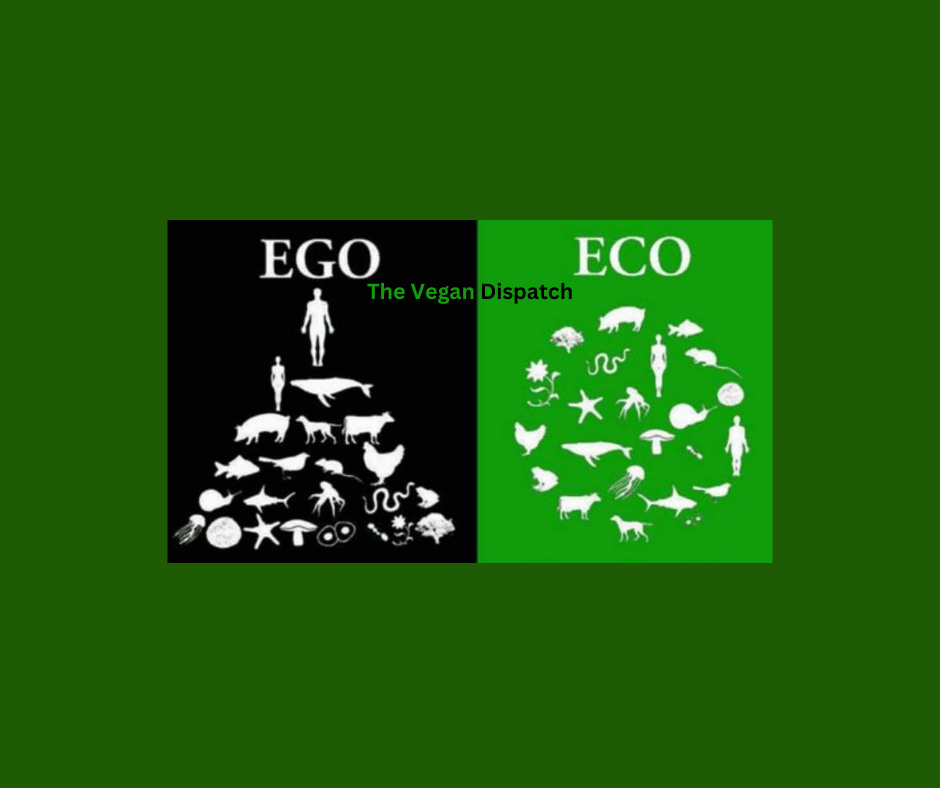Unpacking the Meme: Vegan vs. Carnist Ecology
The following breaks down why veganism rocks for the planet and why carnism, well, not so much. Memes like this aren't just for laughs; they're vegan activism in action - snap-shots - spreading awareness about how our food choices can either help or harm the environment.
‘‘Veganism: A sustainable choice that reduces emissions, preserves resources, protects biodiversity, and conserves water. Carnism, on the other hand, fuels deforestation, pollution, greenhouse gases, and resource depletion. Our diet shapes our planet's destiny.’’
Let's decode the meme’s message and see why it matters to our world.
Veganism: Pro Ecology
1. Reduced Carbon Footprint: Veganism minimizes greenhouse gas emissions by eliminating livestock farming, a major contributor to climate change.
2. Preservation of Resources: Plant-based diets require fewer resources like land, water, and energy compared to animal agriculture, thus conserving precious environmental resources.
3. Biodiversity Conservation: Veganism helps protect biodiversity by reducing deforestation for livestock grazing and preserving natural habitats.
4. Water Conservation: Vegan diets consume significantly less water, as animal agriculture is water-intensive, contributing to water scarcity worldwide.
Human Ego Fueled by Carnism: Anti-Environment
1. Deforestation: Carnism drives deforestation for livestock grazing, leading to habitat destruction and loss of biodiversity.
2. Pollution: Animal agriculture pollutes waterways with animal waste and chemicals, harming ecosystems and aquatic life.
3. Greenhouse Gas Emissions: Carnism generates high levels of greenhouse gases, exacerbating climate change and environmental degradation.
4. Resource Depletion: Carnism depletes resources inefficiently, contributing to land degradation, water scarcity, and energy consumption, undermining ecological balance.
In summary, veganism emerges as a powerful ally for ecological preservation, offering solutions to mitigate climate change, conserve resources, safeguard biodiversity, and alleviate water scarcity. Conversely, carnism's ecological footprint looms large, driving deforestation, pollution, greenhouse gas emissions, and resource depletion. The choice between these dietary paradigms shapes the fate of our planet.
For a change-up!
In the video below, we will review some anti-vegan memes from the anti-vegan subreddit. We will cringe, call out some BS, and see if any of them are funny.😁(credit: David Ramms)
Resources
Books:
Dominion: The Power of Animals in Nature and in Our Imagination by Matthew Scully
Animal Liberation by Peter Singer
Eating Animals by Jonathan Safran Foer
A Billion Hungry Mouths: Feeding the World Without Consuming the Planet by Colin Tudge
Websites and organizations:
Documentaries:
Academic articles:
"The Case for Animal Rights" by Tom Regan
‘‘Why We Love Dogs, Eat Pigs, and Wear Cows: An Introduction to Carnism’’ by Melanie Joy
‘‘Animal Rights: The Abolitionist Approach’’ by Gary L. Francione
‘‘Fellow Creatures: Our Obligations to the Other Animals’’ by Christine Korsgaard
Receive a single informative article daily at 12:01 AM by email. For additional updates, explore my homepage with exciting vegan and plant-based news content and delightful and delicious recipes. Stay connected to the vegan world and all it has to offer.
Visit The Vegan Project Global our Facebook page for more vegan outreach and education.
Also, visit our new YouTube channel
The information on this vegan/plant-based blog is for general informational purposes only. It is not intended as legal, medical, or professional advice. Readers should consult with appropriate professionals for specific advice tailored to their situation. The blog owner is not responsible for any reliance on the information herein.




